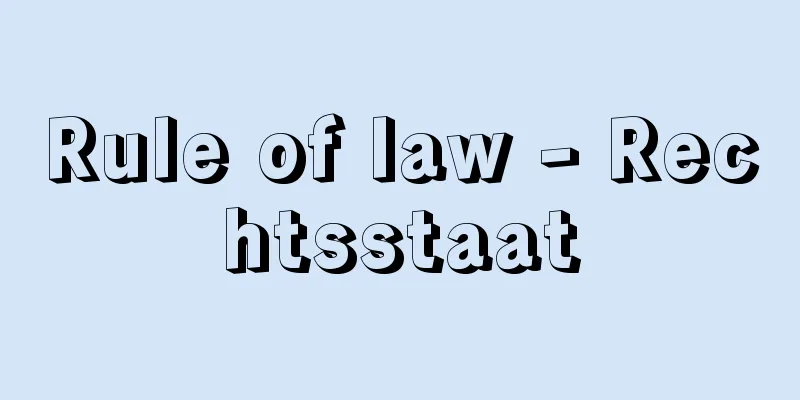Rule of law - Rechtsstaat

|
A state based on the rule of law, which holds that the executive and judicial functions should be carried out in accordance with the laws enacted by Parliament in advance. In other words, the conformity of national actions to the law was considered to be the essence of a state based on the rule of law. However, unlike the "rule of law" in British law, the emphasis was on the formal aspect of the executive and judicial functions being in conformity with the laws enacted by Parliament, the representative body of the people. As a result, the theory of a state based on the rule of law played a negative role, saying that it was okay to violate the rights and freedoms of the people as long as they were based on the law, and contained a tendency toward legal omnipotence that neglected the purpose and content of the law and the state. After World War II, West Germany reflected on this point and recognized the inviolable and inalienable fundamental human rights that directly bind the legislature, the executive, and the judiciary. To ensure this, it established a constitutional court and gave it the power to review the constitutionality of laws and regulations. In Japan, the constitution also gives the court the so-called power of review of laws (Article 81). In this way, the principle has been established that not only must the executive and judicial branches conform to the law in formal terms, but that the purpose and content of the law itself must conform to the Constitution, thereby ensuring the practical implementation of the rule of law. Source: Encyclopaedia Britannica Concise Encyclopedia About Encyclopaedia Britannica Concise Encyclopedia Information |
|
行政および司法があらかじめ議会の制定した法律によって行われるべきであるという法治主義による国家。すなわち全国家作用の法律適合性ということが法治国家の本質とされたのであるが,その際,イギリス法の「法の支配」 rule of lawと違い,行政および司法が国民の代表機関たる議会によって制定された法律に適合していればよいという形式的側面が重視された結果,法治国家論は,法律に基づきさえすれば国民の権利,自由を侵害してもよいという否定的な機能を果し,法や国家の目的,内容を軽視する法律万能主義的な傾向を内包していた。第2次世界大戦後,西ドイツはこの点に反省を加え,立法,行政および裁判を直接に拘束する不可侵,不可譲の基本的人権を承認し,これを確保するために憲法裁判所を設置して,これに法令の憲法適合性を審査する権限を与えた。日本の場合も,憲法は裁判所にいわゆる法令審査権を与えている (81条) 。このようにして,行政,司法が単に法律に適合しているという形式面のみならず,その法律の目的,内容そのものが憲法に適合しなければならないという原則が確立され,それによっていわば法治主義の実質的貫徹が期されている。
出典 ブリタニカ国際大百科事典 小項目事典ブリタニカ国際大百科事典 小項目事典について 情報 |
<<: Hochi Shimbun - Hochi Shimbun
>>: Bulletproof vest - bulletproof vest
Recommend
Whaling ship - Hogeisen (English spelling) Whale catcher
Also called a catcher boat. A fast boat used for c...
Tolerance control -
... x = ( x1 , ..., xn ) is a state vector, and u...
Kobus defassa (English spelling) Kobusdefassa
…[Yoshiharu Imaizumi]. … *Some of the terminology...
Sasayama Basin
A basin in the Tamba region in eastern Hyogo Pref...
Rondeletiidae
…A general term for marine fishes belonging to th...
King Yeongjo
Year of death: August 5, 40th year of King Yeongjo...
Akizuki-so
A manor located in Awa County, Awa Province. It is...
Transducer
When a physical quantity is used as a medium to tr...
Kiranti (English spelling)
…An ethnic group in the eastern mountainous regio...
Family: Scyllidae - Red Scyllidae
...An insect of the family Scyllidae (illustratio...
Demokritos
Ancient Greek philosopher. Born in Abdera, a town...
societas publicanorum (English notation) societas publicanorum
…They exploited the natives of the provinces and ...
Japan Theatre Association
An organization whose objectives are to improve t...
Rashamen
A derogatory term for Japanese women who became co...
Cabral, Amilcar
Born: September 12, 1924 in Bafata Died January 20...









